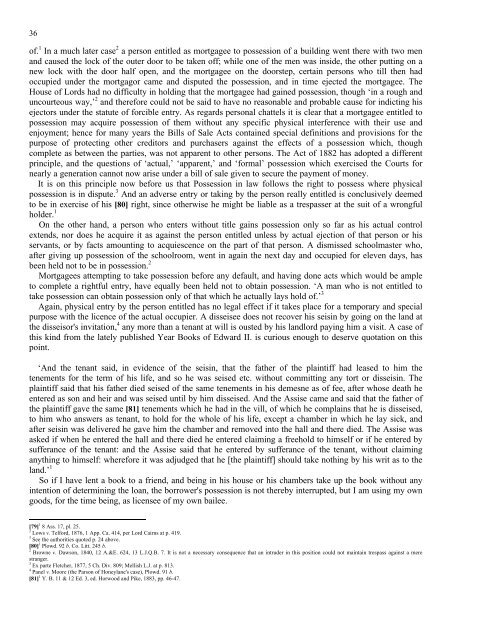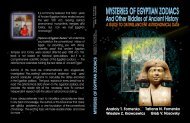possession in the common law - HiddenMysteries Information Central
possession in the common law - HiddenMysteries Information Central
possession in the common law - HiddenMysteries Information Central
Create successful ePaper yourself
Turn your PDF publications into a flip-book with our unique Google optimized e-Paper software.
36<br />
of. 1 In a much later case 2 a person entitled as mortgagee to <strong>possession</strong> of a build<strong>in</strong>g went <strong>the</strong>re with two men<br />
and caused <strong>the</strong> lock of <strong>the</strong> outer door to be taken off; while one of <strong>the</strong> men was <strong>in</strong>side, <strong>the</strong> o<strong>the</strong>r putt<strong>in</strong>g on a<br />
new lock with <strong>the</strong> door half open, and <strong>the</strong> mortgagee on <strong>the</strong> doorstep, certa<strong>in</strong> persons who till <strong>the</strong>n had<br />
occupied under <strong>the</strong> mortgagor came and disputed <strong>the</strong> <strong>possession</strong>, and <strong>in</strong> time ejected <strong>the</strong> mortgagee. The<br />
House of Lords had no difficulty <strong>in</strong> hold<strong>in</strong>g that <strong>the</strong> mortgagee had ga<strong>in</strong>ed <strong>possession</strong>, though ‘<strong>in</strong> a rough and<br />
uncourteous way,’ 2 and <strong>the</strong>refore could not be said to have no reasonable and probable cause for <strong>in</strong>dict<strong>in</strong>g his<br />
ejectors under <strong>the</strong> statute of forcible entry. As regards personal chattels it is clear that a mortgagee entitled to<br />
<strong>possession</strong> may acquire <strong>possession</strong> of <strong>the</strong>m without any specific physical <strong>in</strong>terference with <strong>the</strong>ir use and<br />
enjoyment; hence for many years <strong>the</strong> Bills of Sale Acts conta<strong>in</strong>ed special def<strong>in</strong>itions and provisions for <strong>the</strong><br />
purpose of protect<strong>in</strong>g o<strong>the</strong>r creditors and purchasers aga<strong>in</strong>st <strong>the</strong> effects of a <strong>possession</strong> which, though<br />
complete as between <strong>the</strong> parties, was not apparent to o<strong>the</strong>r persons. The Act of 1882 has adopted a different<br />
pr<strong>in</strong>ciple, and <strong>the</strong> questions of ‘actual,’ ‘apparent,’ and ‘formal’ <strong>possession</strong> which exercised <strong>the</strong> Courts for<br />
nearly a generation cannot now arise under a bill of sale given to secure <strong>the</strong> payment of money.<br />
It is on this pr<strong>in</strong>ciple now before us that Possession <strong>in</strong> <strong>law</strong> follows <strong>the</strong> right to possess where physical<br />
<strong>possession</strong> is <strong>in</strong> dispute. 3 And an adverse entry or tak<strong>in</strong>g by <strong>the</strong> person really entitled is conclusively deemed<br />
to be <strong>in</strong> exercise of his [80] right, s<strong>in</strong>ce o<strong>the</strong>rwise he might be liable as a trespasser at <strong>the</strong> suit of a wrongful<br />
holder. 1<br />
On <strong>the</strong> o<strong>the</strong>r hand, a person who enters without title ga<strong>in</strong>s <strong>possession</strong> only so far as his actual control<br />
extends, nor does he acquire it as aga<strong>in</strong>st <strong>the</strong> person entitled unless by actual ejection of that person or his<br />
servants, or by facts amount<strong>in</strong>g to acquiescence on <strong>the</strong> part of that person. A dismissed schoolmaster who,<br />
after giv<strong>in</strong>g up <strong>possession</strong> of <strong>the</strong> schoolroom, went <strong>in</strong> aga<strong>in</strong> <strong>the</strong> next day and occupied for eleven days, has<br />
been held not to be <strong>in</strong> <strong>possession</strong>. 2<br />
Mortgagees attempt<strong>in</strong>g to take <strong>possession</strong> before any default, and hav<strong>in</strong>g done acts which would be ample<br />
to complete a rightful entry, have equally been held not to obta<strong>in</strong> <strong>possession</strong>. ‘A man who is not entitled to<br />
take <strong>possession</strong> can obta<strong>in</strong> <strong>possession</strong> only of that which he actually lays hold of.’ 3<br />
Aga<strong>in</strong>, physical entry by <strong>the</strong> person entitled has no legal effect if it takes place for a temporary and special<br />
purpose with <strong>the</strong> licence of <strong>the</strong> actual occupier. A disseisee does not recover his seis<strong>in</strong> by go<strong>in</strong>g on <strong>the</strong> land at<br />
<strong>the</strong> disseisor's <strong>in</strong>vitation, 4 any more than a tenant at will is ousted by his landlord pay<strong>in</strong>g him a visit. A case of<br />
this k<strong>in</strong>d from <strong>the</strong> lately published Year Books of Edward II. is curious enough to deserve quotation on this<br />
po<strong>in</strong>t.<br />
‘And <strong>the</strong> tenant said, <strong>in</strong> evidence of <strong>the</strong> seis<strong>in</strong>, that <strong>the</strong> fa<strong>the</strong>r of <strong>the</strong> pla<strong>in</strong>tiff had leased to him <strong>the</strong><br />
tenements for <strong>the</strong> term of his life, and so he was seised etc. without committ<strong>in</strong>g any tort or disseis<strong>in</strong>. The<br />
pla<strong>in</strong>tiff said that his fa<strong>the</strong>r died seised of <strong>the</strong> same tenements <strong>in</strong> his demesne as of fee, after whose death he<br />
entered as son and heir and was seised until by him disseised. And <strong>the</strong> Assise came and said that <strong>the</strong> fa<strong>the</strong>r of<br />
<strong>the</strong> pla<strong>in</strong>tiff gave <strong>the</strong> same [81] tenements which he had <strong>in</strong> <strong>the</strong> vill, of which he compla<strong>in</strong>s that he is disseised,<br />
to him who answers as tenant, to hold for <strong>the</strong> whole of his life, except a chamber <strong>in</strong> which he lay sick, and<br />
after seis<strong>in</strong> was delivered he gave him <strong>the</strong> chamber and removed <strong>in</strong>to <strong>the</strong> hall and <strong>the</strong>re died. The Assise was<br />
asked if when he entered <strong>the</strong> hall and <strong>the</strong>re died he entered claim<strong>in</strong>g a freehold to himself or if he entered by<br />
sufferance of <strong>the</strong> tenant: and <strong>the</strong> Assise said that he entered by sufferance of <strong>the</strong> tenant, without claim<strong>in</strong>g<br />
anyth<strong>in</strong>g to himself: wherefore it was adjudged that he [<strong>the</strong> pla<strong>in</strong>tiff] should take noth<strong>in</strong>g by his writ as to <strong>the</strong><br />
land.’ 1<br />
So if I have lent a book to a friend, and be<strong>in</strong>g <strong>in</strong> his house or his chambers take up <strong>the</strong> book without any<br />
<strong>in</strong>tention of determ<strong>in</strong><strong>in</strong>g <strong>the</strong> loan, <strong>the</strong> borrower's <strong>possession</strong> is not <strong>the</strong>reby <strong>in</strong>terrupted, but I am us<strong>in</strong>g my own<br />
goods, for <strong>the</strong> time be<strong>in</strong>g, as licensee of my own bailee.<br />
[79] 1 8 Ass. 17, pl. 25.<br />
2<br />
Lows v. Telford, 1876, 1 App. Ca. 414, per Lord Cairns at p. 419.<br />
3<br />
See <strong>the</strong> authorities quoted p. 24 above.<br />
[80] 1 Plowd. 92 b, Co. Litt. 245 b.<br />
2<br />
Browne v. Dawson, 1840, 12 A.&E. 624, 13 L.J.Q.B. 7. It is not a necessary consequence that an <strong>in</strong>truder <strong>in</strong> this position could not ma<strong>in</strong>ta<strong>in</strong> trespass aga<strong>in</strong>st a mere<br />
stranger.<br />
3<br />
Ex parte Fletcher, 1877, 5 Ch. Div. 809; Mellish L.J. at p. 813.<br />
4<br />
Panel v. Moore (<strong>the</strong> Parson of Honeylane's case), Plowd. 91 b.<br />
[81] 1 Y. B. 11 & 12 Ed. 3, ed. Horwood and Pike, 1883, pp. 46-47.



